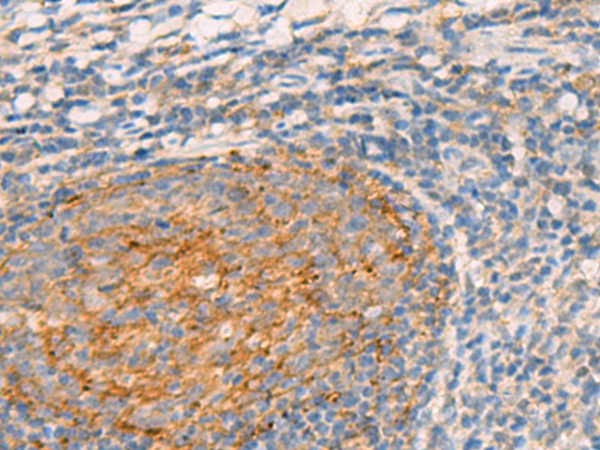
| WB | 咨询技术 | Human,Mouse,Rat |
| IF | 咨询技术 | Human,Mouse,Rat |
| IHC | 1/20-1/100 | Human,Mouse,Rat |
| ICC | 技术咨询 | Human,Mouse,Rat |
| FCM | 咨询技术 | Human,Mouse,Rat |
| Elisa | 1/5000-1/10000 | Human,Mouse,Rat |
| Aliases | EVI; MRP; GPR177; mig-14; C1orf139 |
| Host/Isotype | Rabbit IgG |
| Antibody Type | Primary antibody |
| Storage | Store at 4°C short term. Aliquot and store at -20°C long term. Avoid freeze/thaw cycles. |
| Species Reactivity | Human, Mouse, Rat |
| Immunogen | Synthetic peptide of human WLS |
| Formulation | Purified antibody in PBS with 0.05% sodium azide and 50% glycerol. |
+ +
以下是关于WLS抗体的3篇参考文献,涵盖其在不同研究中的应用:
---
1. **"Wntless, a conserved membrane protein dedicated to the secretion of Wnt proteins from signaling cells"**
*Bänziger et al. (2006)*
该研究首次鉴定WLS蛋白(Wntless)在果蝇和小鼠中调控Wnt蛋白分泌的关键作用。作者通过生成特异性WLS抗体,证实其在Wnt分泌细胞中的定位,并证明WLS缺失会导致Wnt信号通路缺陷。
2. **"Secreted Wnt transporters and signalling in tissue homeostasis"**
*Bartscherer et al. (2006)*
文章揭示了WLS介导的Wnt蛋白跨膜转运机制。研究利用WLS抗体进行免疫沉淀和免疫荧光实验,证明WLS与Wnt蛋白直接结合,并调控其在干细胞稳态中的分泌过程。
3. **"Wnt signaling in cancer stem cells: The role of Wntless in tumor progression"**
*Coombs et al. (2010)*
该研究分析WLS在结直肠癌中的表达及其临床意义。通过WLS抗体的免疫组化检测,发现WLS高表达与肿瘤侵袭性相关,提示其作为癌症治疗靶点的潜力。
---
以上文献均涉及WLS抗体的实验应用,包括蛋白定位、机制研究和临床关联分析。如需具体期刊名称或页码,建议通过PubMed或Google Scholar按标题检索。
**Background of WLS Antibody**
The Wntless (WLS) protein, also known as GPR177 or EVI, is a conserved transmembrane protein critical for the secretion and proper trafficking of Wnt signaling molecules. Wnt proteins play pivotal roles in embryonic development, tissue homeostasis, stem cell regulation, and cancer progression. WLS acts as a dedicated chaperone, facilitating the post-translational processing and transport of lipid-modified Wnt proteins from the Golgi apparatus to the cell surface. Its dysfunction disrupts Wnt signaling, leading to developmental defects and disease pathologies, including cancer and neurodegenerative disorders.
WLS antibodies are essential tools for studying Wnt-related pathways. They enable the detection and localization of WLS in cells and tissues, helping researchers investigate its expression patterns, interaction partners, and regulatory mechanisms. These antibodies are widely used in techniques like Western blotting, immunohistochemistry, and immunofluorescence. In cancer research, WLS antibodies help assess overexpression in tumors, such as colorectal or breast cancers, where aberrant Wnt signaling drives malignancy. Additionally, they aid in exploring therapeutic strategies targeting the Wnt secretory pathway.
The development of specific WLS antibodies has advanced understanding of Wnt secretion biology, offering insights into developmental processes and disease mechanisms, while supporting drug discovery efforts aimed at modulating Wnt signaling.
×